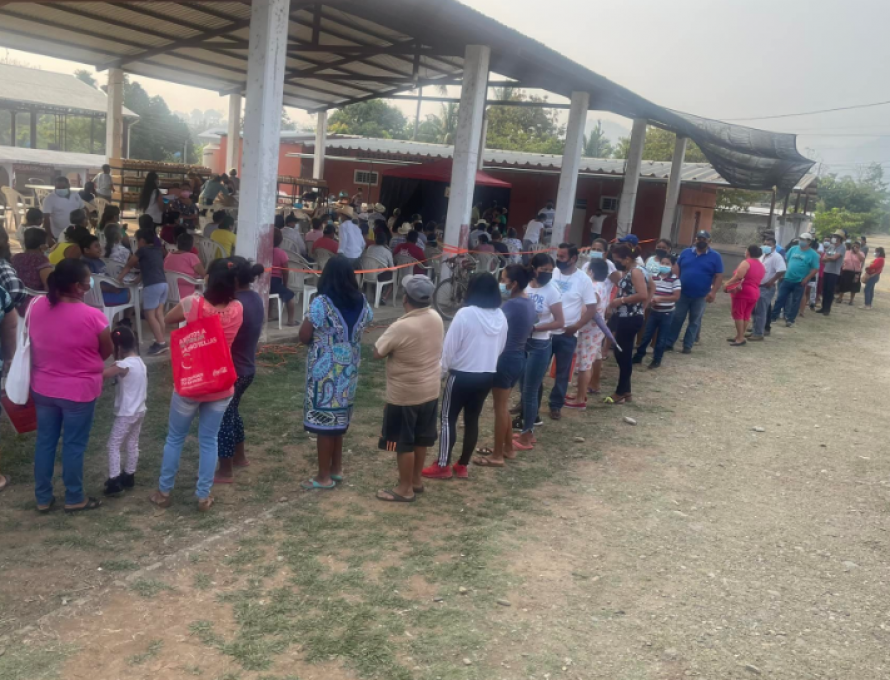ARNOLD – Two Missouri vision ministries, working in partnership, are clearly focused on evangelism through improving sight in their eyeglass clinics in the U.S. and Central America.
Steve Smith, director of Focus On Missions, founded the organization about 20 years ago. For a time, he worked with pastors and churches in Mexico on other projects. Ten years ago, Smith—a member at First Baptist Arnold—began focusing exclusively on eyeglass clinics in the United States when he noticed a need for eyeglasses from people who couldn’t afford them.
Larry Merry, a member of Concord Church in Jefferson City, directs Vision 3:16—a separate organization but one that also operates eyeglass clinics. He and Smith have been friends about 20 years when the two bonded over their similar ministries.
“Larry is taking care of the clinics in Mexico and El Salvador,” Smith says.
“I’m taking care of the clinics in the United States. We work in harmony with each other.”
Both men offer the eyeglass clinics, they say, because the outcomes have eternal potential.
“When somebody receives vision,” Smith says, “and they’re able to see and they’re able to read and do things, it’s a whole new world for them.”
“While we do take eyeglasses and give them out for free,” Merry says, “eyeglasses are just the attraction to get people to come. The real purpose for doing a clinic is to share the gospel of Jesus Christ.”
During a clinic visitors pass through several stations, including registration, a wall chart eye exam, individual eye measurement to determine their prescription, a vision acuity procedure to match and issue the best available glasses, and a gospel presentation.
“We pray with every single person at every single station,” Smith says. “Following the last station they go to an evangelism station. (Volunteers) will speak to the person about their relationship with Christ.”
Typically, the churches hosting the clinics have a particular focus.
“We work hand in hand with a local church that’s trying to reach the needy, the poor, the homeless,” Smith says.
“Over 90% of the people we serve,” Merry says, “have never had a pair of glasses and never will if they don’t attend one of our clinics. They learn to cope with whatever vision they were born with and for some that is very limiting to what they can do.”
Though the organizations are independent they operate similarly. Both rely on local churches to host clinics and volunteers to run them. Volunteers may come from the same congregation or—if the church is too small—from a traveling mission team. The host church also has a post-clinic responsibility.
“The role of the local church,” Merry says, “is to follow up with those who respond and to get them to become part of a church fellowship and Bible study.”
Donated glasses come from various sources.
“The primary source of eyeglasses is from the Missouri Lions Clubs,” says Merry. “Over 95% of our glasses come from this source.” Smith says glasses also come from individuals, churches, and organizations.
“We have people who give us boxes of glasses,” Smith says. “We have people who give us zip-locked bags of glasses. We’ve never had an issue with not enough glasses. They appear out of everywhere.”
Smith sends his eyeglass donations to Vision 3:16, which processes them before they’re shared between the two organizations. Before being issued to an individual, the glasses have to be read for their prescriptions, cataloged, and inventoried.
“Larry has a group of people at Concord Baptist Church in Jefferson City,” Smith says. “They do all the reading of the glasses. They do all the inventory. They take care of all of the behind the scenes work, which is a tremendous amount of work.”
Focus On Missions holds about 30, one-day eyeglass clinics around the U.S., mostly on weekends. Some “extended”—or multi-day—eyeglass clinics are held during the week. Last August, for example, Focus On Missions held eyeglass clinics in Montana for two weeks, supporting Missouri Baptist efforts to help churches there.
Merry says Vision 3:16 does fewer clinics. “In 2022 we have eight international clinics scheduled in Mexico and El Salvador.” He’s also had clinics in Cambodia. Vision 3:16 clinics tend to be multi-day events.
Smith says, “We’ve got it down so we go into a church and set up at 8 o’clock in the morning. We run the clinic from 10 o’clock in the morning to usually 2 or 3 o’clock in the afternoon. And, we’re generally always out of the clinic by 4 o’clock.”
“We can do a clinic with whatever number of volunteers we get,” Merry says, “but to maximize the number of people we can serve a team of 18 to 20 people is needed. With a full team we will serve 1,000 people in a three-day clinic.”
Both men say their greatest needs are churches to host clinics and teams willing to run them.
Churches wanting to host a U.S. clinic or supply a team can call Smith at 314-406-1448.
To contact Vision 3:16 about an international clinic, text or phone Merry at 573-619-0013, or email him at Larry.d.merry@gmail.com. The organization’s online site is www.EyeglassVision316.com.

